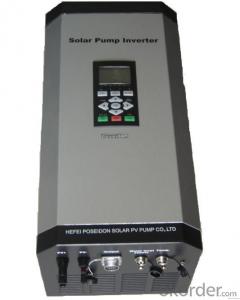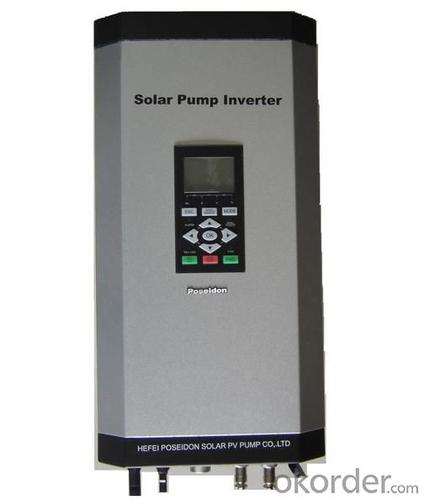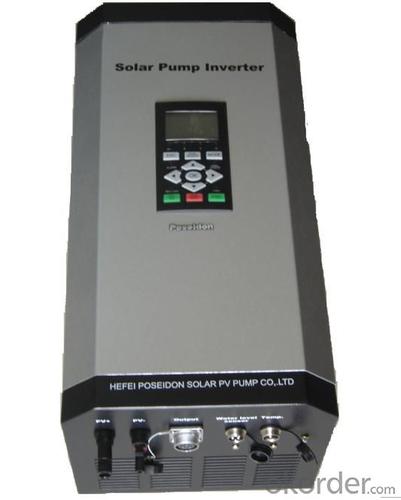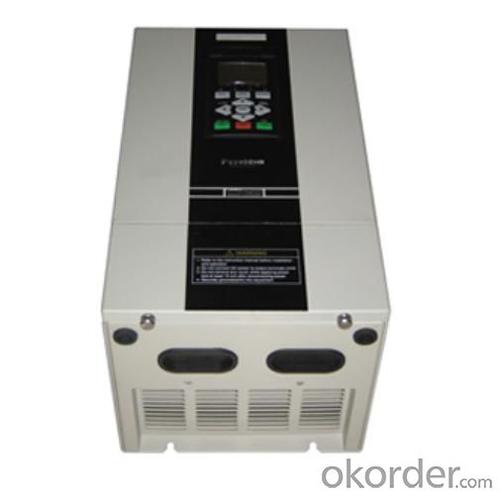Seaflo Solar Pump FCPM2200L Inverter
- Loading Port:
- China Main Port
- Payment Terms:
- TT OR LC
- Min Order Qty:
- -
- Supply Capability:
- -
OKorder Service Pledge
Quality Product, Order Online Tracking, Timely Delivery
OKorder Financial Service
Credit Rating, Credit Services, Credit Purchasing
You Might Also Like
Solar pump inverter FCPM2200L Product Description:
Solar water pumping system is constructed with solar panel array,solar pump inverter and AC water pump, DC current produced from solar panel will be delivered to solar pump inverter,and it will convert it into AC current to drive water pump,and will automatically regulate output frequency according to sun radiance intensity,maximally realize MPPT tracking function.
Features
Adopting the proposed dynamic VI maximum power point tracking (MPPT) control method, with fast response, and reliable operation, achieves efficiency of 99%.
Designed with variable frequency driver, greatly improves efficiency
Extremely high efficiency
Digital mode control, with automatic operation and manual operation mode options
Complete protection functions
Adopts intelligent IPM module, with high reliability
LCD display and operation panel, in real time presents operating data
Optional for water level measurement and control circuit
Applicable for general ACC pumps, like centrifugal pump, piston pump etc.
Independent intellectual property; Highly effective, the redundant reliability, exempts the maintenance and the long life.
The pumps are soft started, fully protected.
No batteries are used. So better Sunlight, more water.
Datasheet.
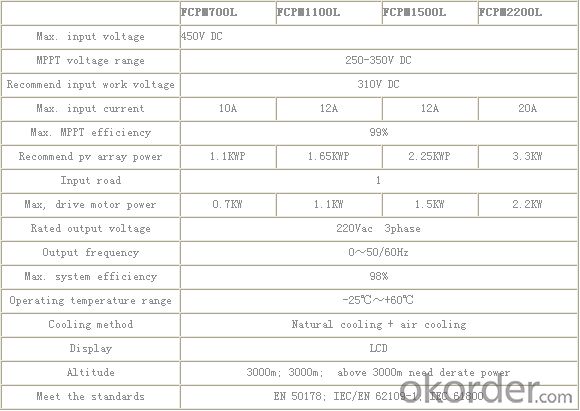
- Q: What is the lifespan of a solar pump controller?
- The longevity of a solar pump controller can vary based on a number of factors, including the controller's quality, operating conditions, and maintenance. Typically, a well-crafted and adequately maintained solar pump controller can endure for approximately 10 to 20 years. However, it's important to note that controllers of lesser quality may have a shorter lifespan due to inferior materials or components. Moreover, operating conditions significantly influence the lifespan of a solar pump controller. Extreme temperatures, excessive moisture, and exposure to harsh elements all contribute to the controller's gradual deterioration. Therefore, it is advisable to install the controller in a protected environment and ensure proper ventilation to prevent overheating. To maximize the lifespan of a solar pump controller, regular maintenance is essential. This involves regular cleaning, checking for loose connections, and updating firmware and software as needed. Additionally, conducting routine inspections to detect any signs of wear or damage is crucial, as promptly addressing these issues can prevent further complications. In conclusion, the lifespan of a solar pump controller can range from 10 to 20 years, contingent upon factors such as quality, operating conditions, and maintenance. By properly caring for the controller and promptly addressing any concerns, its lifespan can be prolonged and the solar pumping system can operate efficiently.
- Q: Are there any limitations on the water pressure or flow rate for a solar pump?
- Yes, there are limitations on the water pressure and flow rate for a solar pump. These limitations are determined by the power and efficiency of the solar panel, as well as the design and capacity of the pump itself. The water pressure and flow rate will vary depending on factors such as the intensity of sunlight, the angle and orientation of the solar panel, and the size and type of pump being used. It is important to carefully select a solar pump that meets the specific requirements of the intended application to ensure optimal performance.
- Q: Can a solar pump be used in areas with salty or brackish water?
- Yes, a solar pump can be used in areas with salty or brackish water. However, it is important to choose a pump specifically designed for these conditions, as the salt content can cause corrosion and damage to regular pumps. There are solar pumps available that are made with materials resistant to corrosion, allowing them to function effectively in such environments.
- Q: How does a solar pump help in maintaining water quality?
- A solar pump helps in maintaining water quality by promoting continuous water circulation, preventing stagnation and the growth of harmful bacteria and algae. It also reduces the need for manual pumping, which can introduce contaminants into the water. Additionally, solar pumps are often used in conjunction with filtration systems, ensuring that the water is clean and safe for various purposes such as drinking, irrigation, or livestock watering.
- Q: Are there any size limitations for a solar pump system?
- There are no specific size limitations for a solar pump system, as it can be designed and customized to meet the specific needs of different applications, ranging from small-scale residential systems to large-scale commercial or industrial setups. The size of the solar pump system primarily depends on factors such as the required flow rate, total dynamic head, available solar energy, and the volume of water that needs to be pumped.
- Q: What is the maximum elevation a solar pump can pump water to?
- The maximum elevation a solar pump can pump water to depends on various factors such as the power and efficiency of the pump, the size and depth of the water source, and the distance and elevation gain between the pump and the desired destination. Generally, solar pumps have the capability to pump water to elevations ranging from a few meters to several hundred meters, but it is best to consult the specifications and guidelines provided by the manufacturer for accurate information regarding a specific solar pump model.
- Q: Can a solar pump be used for water supply in a remote research facility?
- Yes, a solar pump can be used for water supply in a remote research facility. Solar pumps are an efficient and sustainable solution for remote locations where access to electricity may be limited. They can effectively draw water from a well or any other water source and supply it to the facility, providing a reliable and environmentally friendly water supply.
- Q: Is there any noise generated by a solar pump system?
- Yes, there may be some noise generated by a solar pump system, but the level of noise is generally minimal compared to traditional pump systems. The noise is mainly produced by the mechanical components, such as the motor and pump, but it is typically much quieter than systems powered by electric or diesel motors.
- Q: How does a solar pump help in reducing the risk of drought?
- A solar pump reduces the risk of drought by providing a sustainable and reliable source of water for irrigation, even in areas with limited access to conventional electricity. It harnesses solar energy to power the pump, which helps to maintain adequate water supply for agriculture, thereby mitigating the impact of drought on crops and ensuring their survival and productivity.
- Q: How does a solar pump handle water quality issues?
- A solar pump does not directly handle water quality issues. However, it can indirectly contribute to improving water quality by providing a reliable source of clean water. By pumping water from a well or other water source, a solar pump helps reduce the reliance on contaminated surface water, which may contain pollutants or pathogens. Therefore, while the solar pump itself does not address water quality issues, it plays a crucial role in accessing and utilizing cleaner water sources.
Send your message to us
Seaflo Solar Pump FCPM2200L Inverter
- Loading Port:
- China Main Port
- Payment Terms:
- TT OR LC
- Min Order Qty:
- -
- Supply Capability:
- -
OKorder Service Pledge
Quality Product, Order Online Tracking, Timely Delivery
OKorder Financial Service
Credit Rating, Credit Services, Credit Purchasing
Similar products
Hot products
Hot Searches
Related keywords

